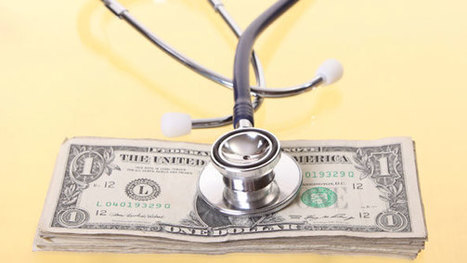“Every man has his price,” as the saying goes, but one has to wonder whether it only takes a $20 sandwich and bowl of soup for the drug industry to buy off many in the medical profession.
Doctors in recent years have come under intense scrutiny for the dubious practices of promoting pricey new brand name drugs after accepting trips, consulting fees and gifts from the pharmaceutical companies that manufacture them.
[Read “More Free Pharma Lunches Served to Docs = More Prescriptions of the Sponsored Drug”; http://sco.lt/5LAeWX]
There was a time when drug companies seeking to increase their share of the lucrative prescription drug industry were tossing around real money. Drug makers at one time lavished gifts and gratuities on doctors recruited to study and promote their new drugs, and those gifts could range from free golf trips and vacations to tickets to hot sports events
However, as The Wall Street Journal reported Tuesday, the drug companies over time began to curtail the gifts and gratuities handed out. Many restrictions were imposed on drug company payments under a code of conduct adopted in 2002 by the Pharmaceutical Research and Manufacturers of America, the drug industry’s leading advocate.
The code allows companies to provide “modest meals” to doctors, which can range from free book and beverages brought to a doctor’s office to free meals at restaurants where doctors can listen to other doctors and sales representatives discuss new drugs coming on the market, according to the Journal.
[However, there have been many breaches of such codes and some codes don’t include meals. Read, for example, “U.S. Seeks Records of 80,000 Novartis `Sham' Events for Doctors”; http://sco.lt/5PtPkX and "’Free Lunch Flaw’ Loophole in Aussie Pharma-Doc Code of Conduct”; http://sco.lt/7KYoVd ]
In the greater scheme of things, meals of this sort are small potatoes. And one has to wonder how such trivial perks can be so effective in motivating a doctor when it comes to prescribing the best medicine for a patient – or whether it is simply a coincidence.
[You might like to read: “The Slippery Slope of Pharma Physician Phreebies”; http://sco.lt/5TS4tV which argues that such thinking is a "slippery slope" on which "Physicians fail to recognize their vulnerability to commercial influences due to self-serving bias, rationalization, and cognitive dissonance."]
As ProPublica’s senior health care reporter Charles Ornstein noted in an analysis of the latest study, “The researchers did not determine if there was a cause-and-effect relationship between payments and prescribing, a far more difficult proposition, but their study adds to a growing pile of research documenting a link between the two.”
And PhRMA complained to the Journal that the study essentially “cherry picked” physician-prescribing data “to advance a false narrative.”
Via Pharma Guy



 Your new post is loading...
Your new post is loading...








Read “More Free Pharma Lunches Served to Docs = More Prescriptions of the Sponsored Drug”; http://sco.lt/5LAeWX
Note: There have been many breaches of such codes and some codes don’t include meals. Read, for example, “U.S. Seeks Records of 80,000 Novartis `Sham' Events for Doctors”; http://sco.lt/5PtPkX and "’Free Lunch Flaw’ Loophole in Aussie Pharma-Doc Code of Conduct”; http://sco.lt/7KYoVd
You also might like to read: “The Slippery Slope of Pharma Physician Phreebies”; http://sco.lt/5TS4tV which argue that "Physicians fail to recognize their vulnerability to commercial influences due to self-serving bias, rationalization, and cognitive dissonance."